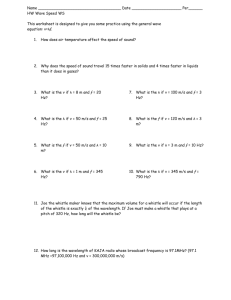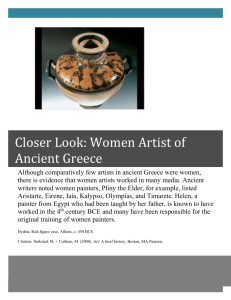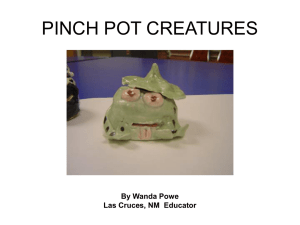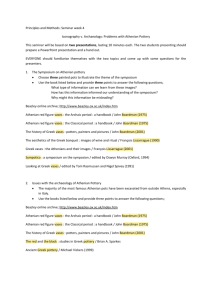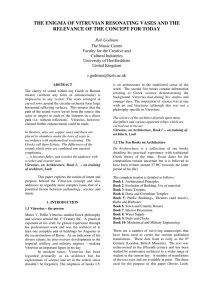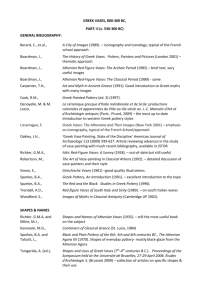Pinch Pot Whistle
advertisement
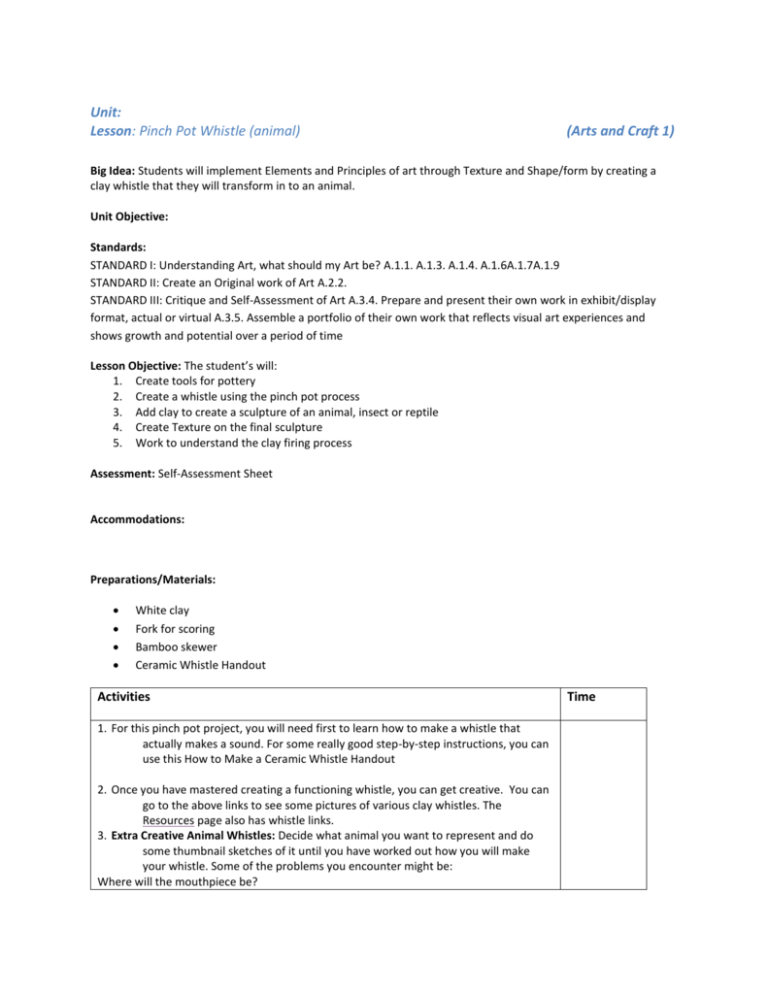
Unit: Lesson: Pinch Pot Whistle (animal) (Arts and Craft 1) Big Idea: Students will implement Elements and Principles of art through Texture and Shape/form by creating a clay whistle that they will transform in to an animal. Unit Objective: Standards: STANDARD I: Understanding Art, what should my Art be? A.1.1. A.1.3. A.1.4. A.1.6A.1.7A.1.9 STANDARD II: Create an Original work of Art A.2.2. STANDARD III: Critique and Self-Assessment of Art A.3.4. Prepare and present their own work in exhibit/display format, actual or virtual A.3.5. Assemble a portfolio of their own work that reflects visual art experiences and shows growth and potential over a period of time Lesson Objective: The student’s will: 1. Create tools for pottery 2. Create a whistle using the pinch pot process 3. Add clay to create a sculpture of an animal, insect or reptile 4. Create Texture on the final sculpture 5. Work to understand the clay firing process Assessment: Self-Assessment Sheet Accommodations: Preparations/Materials: White clay Fork for scoring Bamboo skewer Ceramic Whistle Handout Activities 1. For this pinch pot project, you will need first to learn how to make a whistle that actually makes a sound. For some really good step-by-step instructions, you can use this How to Make a Ceramic Whistle Handout 2. Once you have mastered creating a functioning whistle, you can get creative. You can go to the above links to see some pictures of various clay whistles. The Resources page also has whistle links. 3. Extra Creative Animal Whistles: Decide what animal you want to represent and do some thumbnail sketches of it until you have worked out how you will make your whistle. Some of the problems you encounter might be: Where will the mouthpiece be? Time How will I incorporate the air hole into my design so that the whistle will still work? Can I make the animal without small thin pieces that might break? How can I add pieces to my whistle form without blocking the flow of air? 4. Once your whistle is made, it needs to dry. You will want it to dry slowly. Lightly drape a piece of plastic over it for a few days and then take the plastic off and let it dry for a few more days. It is important that you ensure that it is completely dry before you fire it in the kiln. 5. When you take it out of the kiln, the clay will be very porous and will tend to absorb paint that you put on it. For this reason it is important to seal the surface with a primer. I just use regular latex paint primer or artists' acrylic paint primer. 6. After the primer is dry, you can mix the colors you want on a palette and paint your creature. Closure/Exit slip 3 mins Students will clean up their work area Pinch Pot Vases Rubric Objectives Vases are created by putting two pinch pots together Low Performance At or Below Average At or Above Average Exemplary Performance 10 Points 15 Points 18 Points 20 Points Student did not put Student put two two pots together pots together, or the seam is very but you can still see the seam visible. somewhat. 10 Points 15 Points Seam of pots is There is no visible seam at almost invisible. all on vase. 18 Points 20 Points Sides of vases are Thickness of sides Sides of vases are Sides of vases are Sides of vases are 1/4 inch 1/4 inch thick of vases is 1/2 inch about 1/4 inch about 1/4 inch throughout and very even throughout. or more. It is a thick but there is throughout and and smooth. some almost perfectly heavy vase. unevenness. even 10 Points 15 Points 18 Points 20 Points Vases are glazed Glaze is very spotty Vases are glazed Vases are glazed Vases are evenly glazed inside and out. and uneven. Inside inside and out. inside and out very inside and out. Bottom of may not even be evenly. Bottom pot is neatly painted. No edge not perfectly glazed. thin spots. even. Earned Points 10 Points Designs are impressed into vase. 18 Points 20 Points Student did not Student Designs are Student creates patterns impress designs impressed some impressed neatly within the side shapes. designs into vase, Student has taken the into vases. into vase. but only a few; or assignment a creative student also further step and has scratched created more intricate designs in pottery by designs into vase. impressing objects. 10 Points General Craftsmanship 15 Points 15 Points 18 Points 20 Points Student made a Vases are not Vases are neat; Vases are very neatly sloppy attempt to extremely well- designs are neat. formed and craftsmanship General create 2 vases. formed, but it is is excellent. obvious that craftsmanship is student has good. labored over them. Score: Web Demos 1. http://www.youtube.com/watch?v=cpVObw8X_S4&feature=relmfu 2. http://www.youtube.com/watch?v=ZKfCA2vuozg 3. http://www.youtube.com/watch?v=WcOUx3ayBpo&feature=relmfu
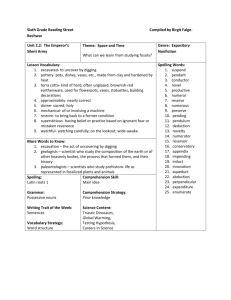

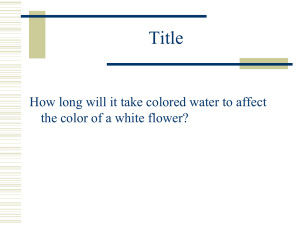
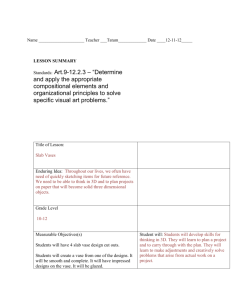
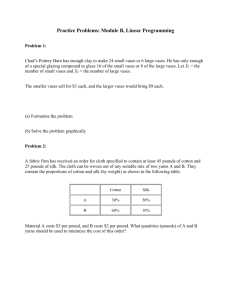
![Irish_Instruments[1]](http://s2.studylib.net/store/data/005225244_1-933d38d948219028b61a355ae6baf1c4-300x300.png)
